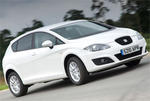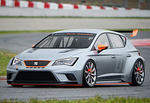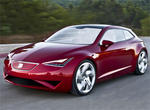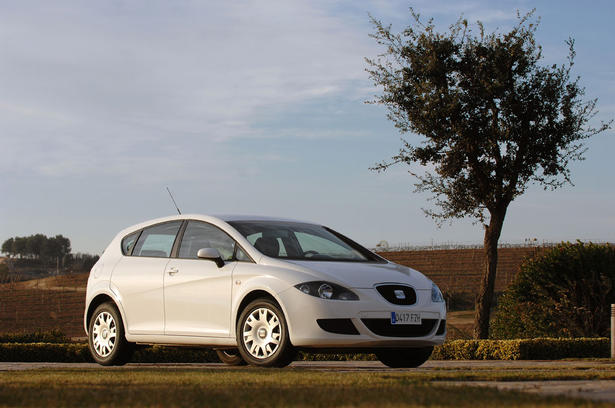
Seat revealed today the new Seat Leon Ecomotive that produces 119 g/km of CO2 emissions. The Seat Leon Ecomotive is powered by a 1.9 TDI engine with DPF particulate filter that develops 105 hp. With this engine, the Seat Leon Ecomotive is capable of running for 100 km with only 3.7 liters of fuel. The Seat Leon Ecomotive is available in three trim versions: Seat Leon Ecomotive Reference, Seat Leon Ecomotive Stylance and Seat Leon Ecomotive Sport Limited.
The b>Seat Leon Ecomotive Sport Limited features sport seats, leather steering wheel, 16 inch alloy wheels, foglamps and black door handles.
Seat Press Release:
Sporty nature that also cares for the environment
Only 119 g/km of CO2 emissions
100 km at 3.7 litres of fuel consumption
Efficient 105 hp 1.9 TDI engine with DPF particulate filter
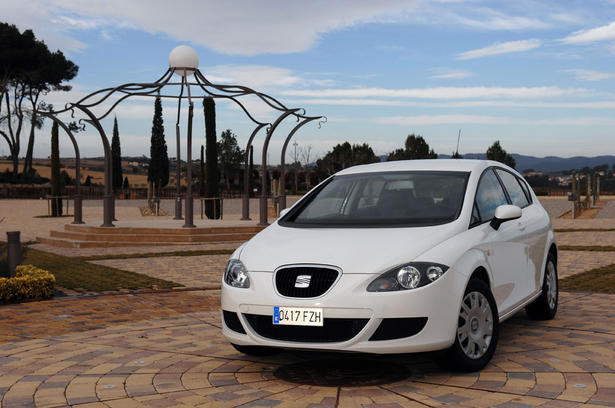
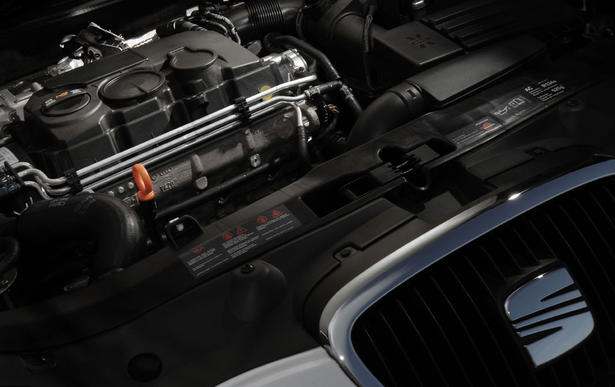
SEAT has demonstrated how it is possible to combine the sporty character of its models with its concern for preserving the environment. At the last Frankfurt Motor Show, SEAT unveiled the Ibiza ECOMOTIVE, whose CO2 emission figure of 99 g/km made it the least polluting model in its segment.
SEAT has now gone one step further with the development of an ECOMOTIVE version for the Leon. With its emissions reduced by 16 g/km, or from 135 to 119, this model can take advantage of tax benefits in many European countries. In Spain for example, a person buying the
Seat Leon Ecomotive is not required to pay any registration tax.
Making the car more ecological did not require modifying its outward appearance. The only difference on the new car is the "ECOMOTIVE" badge on the rear, which identifies it and the Ibiza as SEAT's greenest versions with the lowest CO2 emission levels.
Not only does the car feature low emission levels and tax benefits, but also reduced fuel
consumption figures, making it an economical choice for customers within the Leon range.
From the Leon to the Leon ECOMOTIVE
In order to reduce the CO2 emissions of the Leon, engineers at the Technical Centre worked on four fundamental areas: the engine, the gearbox, the weight and the tyres.
105 hp 1.9 TDI engine with particulate filter
The Seat Leon Ecomotive is equipped with one of the SEAT range's most efficient engines - the 105 hp 1.9 TDI, which has undergone extensive improvements to its electronic management.
Optimisation work on the central control unit and the gearbox's new ratios reduced CO2 emissions to 119 g/km compared with the 135 of the basic version.
Regarding the engine, the Seat Leon Ecomotive has been fitted with a DPF particulate filter as standard equipment, filtering the typical (but small amount of) soot particles that most diesel engines produce. When left unfiltered, these particles remain in suspension and attract other harmful elements. Approximately 0.3% of diesel engine emissions are made up of gases such as carbon monoxide, hydrocarbons, sulphur dioxide, and nitric acids as well as soot.
The engine's control unit constantly checks the state of the filter, and activates regeneration in order to burn up the accumulated soot particles. In other words, thanks to this system the particulate filter requires no maintenance during the car's lifetime.
The new Seat Leon Ecomotive features outstandingly low fuel consumption figures, with a reduction of 0.6 l/100 km on the extra-urban cycle. These new figures make it possible to drive the Seat Leon Ecomotive for almost 1,500 km without refuelling.
New gear ratios
The Martorell Technical Centre also modified the car's gear ratios in order to deliver lower CO2 emission figures.
The new gears are 8.2% longer overall. By maintaining the first and second gear ratios and lengthening third, fourth and fifth - the latter by 16% - compared with the former version, emissions on the Seat Leon Ecomotive have been further reduced by 7 g/km.
Nevertheless, these modifications do not hamper engine performance at all. With its engine torque of 250 Nm at 1,900 rpm, the 1.9 TDI still delivers excellent in-gear acceleration and top speed. Furthermore, the new model's dynamic capability has even been improved, giving 1 km/h faster top speed, while 0 to 100 km/h acceleration is 0.4 seconds and 0 to 1,000 metre acceleration is 0.6 seconds faster - or 186 km/h, 10.9 seconds and 32.6 seconds respectively.
Limited maximum weight
On a car such as the Leon, with its high standards of safety and comfort, it is difficult to reduce the vehicle's minimum weight. But the maximum weight can be limited by eliminating certain options, such as the 17 inch alloy wheels and combinations of equipment if this exceeds the maximum weight of 1,320 kg compared to the current 1,405. This considerable difference has been achieved not only by working on the basic car itself, but by taking a close look at the additional optional equipment in order to keep the car within the desired weight range.
Lower resistance tyres
Another feature of the Seat Leon Ecomotive is lower resistance tyres, making it possible to mount 195/65 tyres on 15 inch wheels or 205/55 tyres on 16 inch wheels.
Available with Reference and Stylance equipment
The Seat Leon Ecomotive will be available with two trim levels. The Reference version features ABS and TCS, double front airbag, side airbags, head airbag, 16 inch steel wheels, 205/55 tyres, Isofix anchoring points, front electric one-touch and anti-trap windows, heated electric body colour door mirrors, air conditioning, CD radio with MP3 and Aux-in and six speakers, among others.
The Stylance version has volumetric alarm, ESP with EBA emergency brake assistance, tyre pressure sensor, 16 inch seven spoke alloy wheels, foglamps, dual zone climatiser, rear power windows, door mirrors with electric park position, leather steering wheel with audio controls, leather gear knob, cruise control, trip computer, coming and leaving home function and two extra speakers.
The special Sport Limited version builds on Reference with sport seats, leather steering wheel, 16 inch alloy wheels, foglamps and black door handles.





